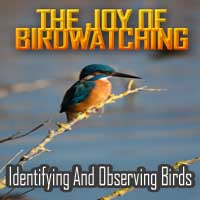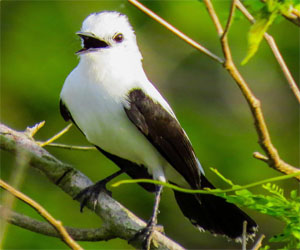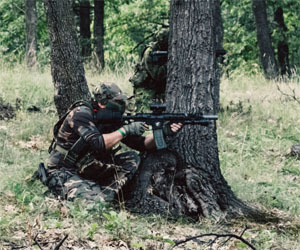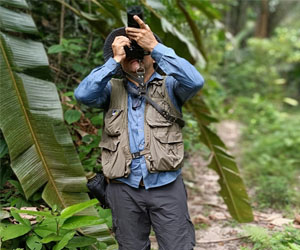


Connecting With The Avian World

For nature lovers, few hobbies are as rewarding and fulfilling as birdwatching. This gentle pursuit allows enthusiasts to immerse themselves in the world of feathered wonders, connecting with nature on a profound level. Birdwatching offers an opportunity to explore, appreciate, and protect the avian realm, making it a perfect pastime for those who hold a deep reverence for the natural world. In this article, we will delve into how birdwatching resonates with nature lovers and why it holds a special place in their hearts.
Nature As A Classroom: Birdwatching transforms the outdoors into an ever-evolving classroom. Nature lovers cherish the opportunity to learn about the diverse species of birds, their behaviors, and their habitats. Every birdwatching outing is a lesson in biology, ecology, and ornithology, providing valuable insights into the interconnectedness of all living things.
Deepening Appreciation: For nature lovers, birdwatching deepens their appreciation of the natural world. It allows them to witness the delicate beauty of birds up close, from the iridescent plumage of hummingbirds to the majestic flights of raptors. Observing birds in their habitats unveils the intricate relationships between flora and fauna.
Conservation Ethic: Birdwatching often goes hand in hand with a strong commitment to conservation. Nature lovers are acutely aware of the threats that birds and their habitats face, from habitat destruction to climate change. Their passion drives them to support initiatives aimed at preserving these vital ecosystems.
Embracing Mindfulness: Birdwatching is an exercise in mindfulness, encouraging individuals to be fully present in the moment. Nature lovers savor the tranquil rhythm of birdwatching, which allows them to escape the stresses of daily life and find solace in the natural world.
Ecosystem Exploration: Birdwatching is a journey into the diverse ecosystems that birds inhabit. Nature lovers revel in the opportunity to explore wetlands, forests, grasslands, and coastal areas, where they can connect with the beauty of these pristine landscapes.
Community And Sharing: Birdwatching is not a solitary pursuit; it's a communal experience. Nature lovers often engage with like-minded individuals in local bird clubs, online forums, and group outings. These communities provide a sense of camaraderie and a platform for shared experiences and knowledge exchange.
Scientific Contribution: Birdwatchers, including many nature lovers, contribute to citizen science projects, collecting valuable data that supports scientific research and conservation. Their observations help monitor bird populations, migration patterns, and the impacts of environmental changes.
Birdwatching is a deeply enriching and fulfilling hobby for nature lovers. It aligns perfectly with their values and passion for the natural world, offering opportunities for learning, appreciation, and a sense of purpose. Whether you're a seasoned nature enthusiast or just beginning to explore the wonders of the avian world, birdwatching is a captivating and meaningful pursuit that fosters a profound connection with the environment and a lifelong commitment to its preservation. So, if you're a nature lover, consider taking up a pair of binoculars and embarking on a journey that will deepen your bond with the world of feathers and inspire you to protect the precious ecosystems they inhabit.
The Essentials For Riding The Waves
 Surfboard: The surfboard is the heart and soul of surfing. Surfboards come in various shapes, sizes, and designs to suit different conditions and riding styles. Shortboards for advanced maneuvers, longboards for stability, and funboards for versatility are just a few examples. The choice of the right surfboard is a crucial decision for any surfer.
Surfboard: The surfboard is the heart and soul of surfing. Surfboards come in various shapes, sizes, and designs to suit different conditions and riding styles. Shortboards for advanced maneuvers, longboards for stability, and funboards for versatility are just a few examples. The choice of the right surfboard is a crucial decision for any surfer.
Leash: A leash, also known as a leg rope, is an essential safety item. It attaches to the tail of your surfboard and to your ankle, ensuring that you won't lose your board in the waves. This not only prevents accidents but also helps you conserve energy by reducing the need to constantly swim back to your board.
Wetsuit: A wetsuit is a surfers' best friend in cold water or inclement weather. It provides insulation to keep you warm and buoyant in the water. Wetsuits come in different thicknesses and styles, allowing surfers to choose the right one for their specific needs.


Paintball Skill Development
 2. Stealth And Camouflage
2. Stealth And Camouflage
Paintball involves a fair amount of sneaking around and avoiding detection. Developing stealth and camouflage skills is vital for staying concealed and moving quietly on the battlefield. Use natural cover, stay low, and minimize noise to enhance your stealth abilities.
3. Speed And Agility
Paintball requires a level of physical fitness, particularly speed and agility. Quick movement, sharp reflexes, and the ability to change positions rapidly can help you evade opponents and seize advantageous locations. Regular cardiovascular and strength training can enhance your overall fitness.
4. Communication And Teamwork
Effective communication and teamwork are essential for success in paintball. Being able to coordinate with your teammates, share information about enemy positions, and work together seamlessly is a fundamental skill. Practice using radios, hand signals, or verbal cues for clear and timely communication.
5. Tactical Awareness
Understanding the tactics and strategies that apply to different game scenarios is a key paintball skill. Familiarize yourself with a variety of tactics, such as flanking, cover fire, and suppression, and adapt them to your team's objectives and the field's layout.
6. Adaptable Strategy
Developing adaptable strategies is crucial because no two paintball games are the same. The ability to adjust your tactics on the fly in response to the evolving situation is a hallmark of a skilled player.
7. Resource Management
Paintballs are finite resources, and learning to manage them effectively is essential. Don't waste shots unnecessarily, and conserve your ammunition for critical moments.
8. Decision-Making Under Pressure
The heat of battle can be intense, and maintaining composure is a vital skill. Practice decision-making under pressure to ensure that you make sound choices when the game is at its most intense.
From Backyard Fun To Global Sport
 Ultimate's roots can be traced back to Columbia High School in Maplewood, New Jersey, in 1968. A group of students led by Joel Silver created a new game that combined elements of soccer, basketball, and football while using a Frisbee as the primary playing object. The game's simple rules, including self-officiation and a strong emphasis on sportsmanship, have remained central to Ultimate's identity.
Ultimate's roots can be traced back to Columbia High School in Maplewood, New Jersey, in 1968. A group of students led by Joel Silver created a new game that combined elements of soccer, basketball, and football while using a Frisbee as the primary playing object. The game's simple rules, including self-officiation and a strong emphasis on sportsmanship, have remained central to Ultimate's identity.
During the early years, Ultimate was primarily played in a casual, grassroots manner, often in backyards, parks, and college campuses. It gained popularity within counterculture circles and was emblematic of the spirit of the 1960s and 1970s, promoting inclusivity, cooperation, and a rejection of traditional authority figures.
As the sport gained momentum, its first governing body, the Ultimate Players Association (now known as USA Ultimate), was established in 1979 to provide structure and consistency to the growing community. This development marked a significant turning point in the sport's evolution. Standardized rules and competitive leagues began to emerge, and tournaments like the National Ultimate Championship became annual events.
The 1980s saw the introduction of gender equity in Ultimate, with mixed-gender teams and the requirement for a balanced gender ratio on the field. This commitment to inclusivity was a pioneering step, setting an example for gender equality in sports that many other disciplines have since followed.






Paintball Strategy And Coordination
 The Role Of Strategy In Paintball
The Role Of Strategy In Paintball
Paintball is not just about firing paint-filled projectiles at opponents; it's about outthinking them. A successful paintball strategy serves as a blueprint for achieving objectives and gaining the upper hand. Here's why strategy matters:
Objective Achievement: In many paintball games, the goal is not just to eliminate opponents but to achieve specific objectives, such as capturing flags or holding positions. A well-thought-out strategy guides the team in achieving these objectives.
Resource Management: Paintballs are finite resources, so effective strategy helps conserve ammunition and use it judiciously. Proper resource management can be a game-saver.
Adaptability: A sound strategy provides a framework, but it must also be adaptable. As the game evolves and circumstances change, a team should be able to adjust its tactics to suit the situation.
Tactical Advantage: Strategic planning can create tactical advantages by anticipating the opponent's moves and positioning your team accordingly. It's about setting up the chessboard before the game begins.
The Power Of Coordination
Effective coordination among team members is another crucial component of success in paintball. Coordination involves seamless communication, teamwork, and synchronized execution of tactics. Here's why it's essential:
Communication: Clear and timely communication is the lifeblood of any team's success. Players must share information about enemy positions, plans, and movements to make informed decisions.
Discovering The World Of Feathers
 Opportunity For Connection: Birdwatching offers a unique opportunity to connect with nature on a personal level. It allows individuals to immerse themselves in the sights and sounds of the outdoors, fostering a deep connection with the environment and the wildlife that inhabits it.
Opportunity For Connection: Birdwatching offers a unique opportunity to connect with nature on a personal level. It allows individuals to immerse themselves in the sights and sounds of the outdoors, fostering a deep connection with the environment and the wildlife that inhabits it.
Health And Well-being: Spending time in nature and engaging in birdwatching can contribute to improved mental and physical health. The hobby encourages outdoor exploration, gentle physical activity, and mental relaxation. It's a meditative experience that reduces stress, promotes mindfulness, and nurtures a sense of well-being.
Lifelong Learning: Birdwatching is a hobby that continuously offers new opportunities for learning. It introduces enthusiasts to the fascinating world of bird species, their behaviors, and their habitats. As you delve deeper into the hobby, your knowledge and appreciation of the avian world grow.
Conservation Awareness: Birdwatchers often become strong advocates for conservation. As they develop an understanding of the environmental challenges birds face, they are more likely to support efforts to protect and preserve bird habitats. Many birdwatching organizations are involved in conservation initiatives.
Community And Camaraderie: Birdwatchers often form close-knit communities and clubs, offering opportunities for shared outings and camaraderie. These groups provide a sense of belonging and the chance to learn from more experienced birders.
Varied Settings: Birdwatching can be pursued in a wide range of settings, from urban parks to remote wilderness areas. Whether you live in a bustling city or a tranquil rural area, there are always opportunities to observe birds.